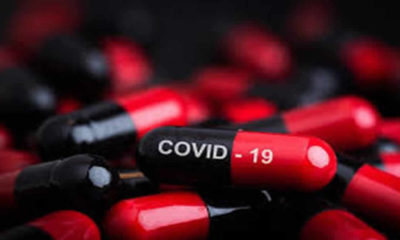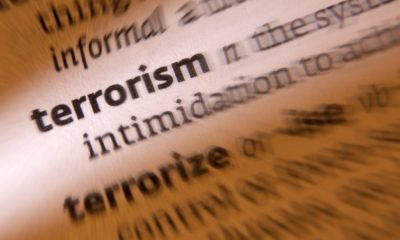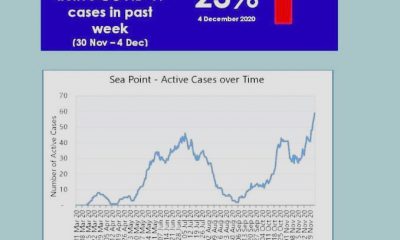
Featured Item

SA expat targets COVID-19 with new nasal spray
Published
2 years agoon
Professor Peter Friedland, a much-loved South African emigrant to Australia, has made a major breakthrough in the fight against COVID-19.
This King David Linksfield alumnus has discovered a virus-killing nasal spray, called Nasodine Nasal Spray, which could be effective in reducing the spread of COVID-19.
Nasodine is based on povidone-iodine, the same active ingredient found in Betadine throat gargle.
“The spray isn’t a treatment for COVID-19,” Friedland, an associate professor at the University of Western Australia’s School of Medicine, told the SA Jewish Report. “I want to stress that straightaway. This isn’t in place of vaccination as the first line of defence. It’s an adjunct to disinfecting, like masks, gloves and social distancing.”
Friedland and his fellow researchers believe it’s important to disinfect people’s noses. “The virus enters the body through the nose,” he says. “If we can kill the virus there, we can perhaps prevent it from spreading to people who aren’t infected.”
About a decade ago in Melbourne, a microbiologist and a pharma developer started researching a nasal spray to prevent and treat the common cold.
Friedland joined the research team in 2017 to start conducting clinical trials on humans to ascertain the spray’s effectiveness against the cold virus.
They embarked on a lengthy process, which involved many rounds of trials. In February 2020, they began researching Nasodine’s effectiveness against COVID-19.
Today, Friedland is the lead author of the study, “In vivo [human] and in vitro inactivation of SARS-CoV-2 with 0.5% povidone-iodine nasal spray”, published by the Australian Journal of Otolaryngology.
“We’ve developed a nasal spray that’s safe and effective against common-cold viruses,” says Friedland. “It can decrease the length of common colds by about 50%. At the beginning of 2020, we tested our spray against the COVID-19 virus.”
Laboratory experiments showed a 15-second exposure to the nasal spray reduced infectivity of SARS-CoV-2 by 99.97%, while a 60-second exposure eliminated viral infectivity.
After discovering this, “we embarked on a pilot study to see whether the spray could kill the COVID-19 virus and inhibit the shedding of the virus in the nose,” Friedland says. “It was a multinational trial undertaken in Australia and the United States. The clinical part of the trial took place in South Africa in collaboration with my South African colleagues.”
“We recruited 15 COVID-19-positive patients in South Africa. They only used the spray for one dose. We continually swabbed their noses, and performed viral and COVID-19 testing.”
As the laboratories in South Africa were too inundated with COVID-19 testing, the samples had to be medically couriered at -70 degrees Celsius to Perth to do the cultures. “We were able to culture only six out of the 14 who were actively shedding,” says Friedland. “In five out of those six patients, we found a significant decrease in COVID-19 viral share.”
Although it was a small sample size, this finding was “compelling because it showed that a single dose of the spread, which is four sprays per nostril, was effective”, says Friedland. “We’re about to embark on a very large phase-two trial in the Western Province and Gauteng.”
This involves a placebo-controlled, double-blinded randomised trial on about 200 COVID-19-positive subjects, meaning that the patients and doctors are unaware whether they are receiving a placebo or the active ingredient.
“This ensures they aren’t biased in terms of reporting what their symptoms are, how they’re feeling, and what their outcome is,” says Friedland. “The laboratory is also blinded because it’s not known which patients the swab tests are coming from.”
Friedland hopes Nasodine will secure the regulatory approval it needs to be sold over the counter. “Since the regulatory authorities are so stringent, we have to prove our efficacy through several trials,” he says. “We’ll perform a phase-three trial if the phase-two trial succeeds. The results should be known within a couple of months. During the winter months, we will also be conducting large phase-three trials in South Africa and Australia on the cold viruses.”
Friedland left South Africa in January 2009 after three of his friends were shot and killed, the last two right in front of him. “Prior to that, I was very committed to South Africa,” he says.
Since 2005, he had been a professor of ear, nose and throat (ENT) at the Wits Donald Gordon Medical Centre. Additionally, he was involved in teaching and dealt with a lot of head and neck traumas at Milpark Hospital in Johannesburg. The highlight of his career was serving as Nelson Mandela’s ENT for about eight years.
“But I was very affected by the personal violence,” he says. “I reluctantly decided to leave South Africa. It took me about a year and I eventually received a six-month job offer in Perth.”
There, he became head of department at one of the major tertiary referral hospitals, the head of department at the University of Notre Dame Australia teaching ENT, and head of department at the University of Western Australia teaching ENT.
He’s still there. “I’m still working and teaching in two of the public hospitals. I run a limited private practice as well. Our hospital treated the first COVID-19 patient in Australia.”
While in Australia, Friedland has published more than 55 scientific research and clinical papers.
In 1979, he matriculated from King David Linksfield, with his identical twin brother, Richard, who became the group chief executive of Netcare.
“People always got confused,” says Friedland. “We were always compared with each other. We were identical in our achievements at school, our sporting and academic achievements.”
Friedland and his brother started studying veterinary science at the University of Pretoria. After four years, Friedland changed to studying medicine at the University of the Witwatersrand. “Richard finished veterinary. I specialised. I completed a Master of Medicine degree. Richard came to study medicine and then an MBA [Master of Business Administration]. The rest is history.”
Friedland wasn’t pulled to Australia. “I was pushed,” he says. “I remain forever grateful and indebted to South Africa.”
Before the pandemic, he regularly visited South Africa, where he supports many institutions. “I’m very proud of the country and its medical profession. We’re working in South Africa because of my proud roots. My Australian research team is impressed with our South African medical colleagues.”











Desre
Mar 24, 2022 at 10:46 pm
An exceptional Doctor so badly missed. You were a lifesaver for my daughter. Watching you operate on her was an honour. Wishing you so much success with this achievement. South Africa’s loss is certainly Australia’s gain.